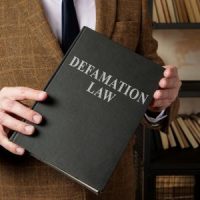What Actually Is Defamation?

Have you ever been threatened to be sued for defamation? Or, have you ever felt like the one being defamed, and felt that you may need to sue to protect your good name and reputation?
Defamation is a threat that is often made without much thought, and many people and businesses are unfamiliar with what defamation actually is, how to prove it, and how to defend against it.
False Fact, Not Opinion
Defamation (which includes libel if the words are written, and slander if the words are spoken), first requires that the statement be one of alleged or purported fact. An opinion cannot, by definition, be defamation. The court will look at the substance of the statement, so saying “In my opinion you stole $100 dollars,” could be construed as fact, and thus actionable defamation, despite the precursor of “in my opinion.”
Once it is established that the speaker was asserting a fact, the fact must actually be false, for there to be a claim for defamation. That means that there is actually a “case within a case” in defamation cases: The first to establish if what was said was actually true, and the second to establish whether, if the statement was indeed false, the other elements of defamation have been met.
Publication
A defamatory statement must be published. This simply means told or conveyed to someone else. You cannot defame someone to only them; there must be someone else who hears the false, defamatory statement, for publication. It doesn’t have to be a large crowd, or any particular group of people—telling even one other person the falsity, can lead to a valid defamation claim.
Damages
Damages can be easy or difficult to prove, depending on the type of defamatory statement that is made.
Some defamatory statements are considered to be per se defamation. This is defamation that harms someone’s good name and reputation, or which harms their business activities, or which implies someone has a disease, or is a criminal or someone who has committed a fraud.
Other defamatory statements are still actionable, but you will have to prove your damages. So, for example, if someone made a statement and it led to you being fired at work, or losing business clients, you would need to prove the value of those losses, if the defamation was not per se defamation.
Intent
Normally, no intent needs to be shown for defamation. Even an “accidental” false statement, can lead to a defamation claim.
Note that public officials may have a more difficult time suing for defamation. This doesn’t just include famous people, but may also include public officials. For them to win a defamation case, they must prove actual malice—that is, that the speaker said what was said intentionally, and with the intent to harm or damage the other person.
Call our Fort Lauderdale business lawyers at Sweeney Law P.A. at 954 440-3993 today for help if you feel you have a defamation, libel or slander business law case.
Sources:
law.cornell.edu/wex/defamation#:~:text=To%20prove%20prima%20facie%20defamation,entity%20who%20is%20the%20subject
findlaw.com/injury/torts-and-personal-injuries/elements-of-libel-and-slander.html

